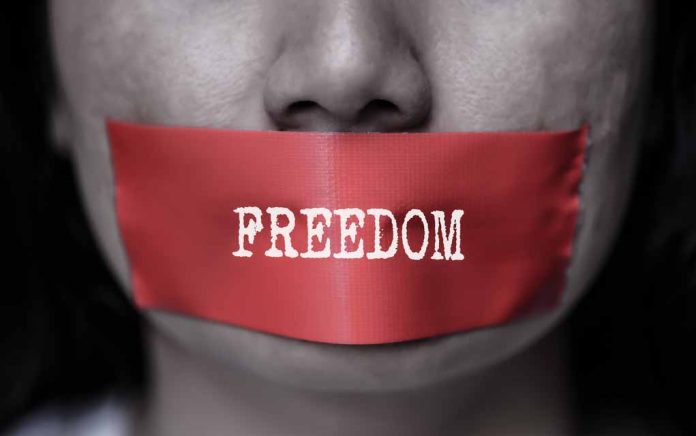
Canada’s Online Harms Act proposes life imprisonment for hate speech, introducing an Orwellian “precrime” system that could imprison citizens before they commit any actual offense.
Key Takeaways
- Bill C-63 introduces unprecedented penalties for hate speech, including life imprisonment for promoting genocide and a “precrime” system allowing preemptive legal action against citizens.
- The legislation enables authorities to place individuals under house arrest or electronic surveillance merely for being suspected of potentially committing future hate crimes.
- Non-compliance with these preemptive restrictions can result in 12-month prison sentences, even without committing an actual crime.
- Critics, including the Canadian Civil Liberties Association, warn the bill’s vague definitions and severe penalties threaten free speech and represent government overreach.
- Senator Kristopher Wells is pushing to revive this legislation under the current government, continuing Trudeau’s censorship agenda.
Canada’s Authoritarian Speech Control Proposal
The Canadian government’s Online Harms Act represents one of the most aggressive government intrusions into free speech seen in any Western democracy. Officially known as Bill C-63, the legislation would create a system of preventative detention and surveillance for citizens who haven’t committed any crimes but are merely suspected of potentially engaging in hate speech. This approach essentially establishes a “precrime” system where Canadian authorities can take legal action against individuals based on the suspicion they might commit speech-related offenses in the future, an unprecedented expansion of government power over citizen expression.
“We need the ability to stop an anticipated hate crime from occurring,” stated Arif Virani, Justice Minister under the Trudeau government.
The bill’s penalties are extraordinarily severe, particularly when compared with other Western democracies. Those found guilty of promoting genocide could face life imprisonment, while individuals merely suspected of potential future hate speech violations could be placed under house arrest or subjected to electronic monitoring. Refusal to comply with these preventative measures would itself become a crime punishable by up to 12 months in prison. This effectively criminalizes resistance to government surveillance before any actual speech crime has occurred, creating a system where dissent against censorship becomes illegal.
A Pattern of Censorship Expansion
The Online Harms Act is not an isolated initiative but part of a broader pattern of increasing government control over speech in Canada. The bill follows previous attempts like Bill C-36, which similarly lapsed due to a general election in 2021. While proponents claim these measures are necessary to protect vulnerable groups from harmful content online, the vague definitions of prohibited speech and the extraordinary enforcement mechanisms reveal the true authoritarian nature of these proposals. Under the proposed legislation, the Canadian Human Rights Commission would be empowered to investigate complaints about content deemed likely to incite “detestation or vilification,” terms left deliberately ambiguous.
“The broad criminal prohibitions on speech in the bill risk stifling public discourse and criminalizing political activism,” warned the Canadian Civil Liberties Association.
Senator Kristopher Wells, the bill’s current champion, has a track record of advocating for policies that challenge traditional values and religious principles. His efforts to revive the Online Harms Act legislation continue the censorship agenda previously pushed by Justin Trudeau’s administration. This persistence despite the bill’s initial failure demonstrates a determination to implement speech controls regardless of public opposition or concerns about constitutional freedoms. The government continues framing these restrictions as necessary protections rather than addressing the fundamental threats to liberty they represent.
What’s more dangerous than a wolf in sheep’s clothing?
Mark Carney, Canada’s unelected WEF darling, just bared his fangs—vowing to strangle free speech with new internet censorship laws.
This isn’t protection; it’s a chokehold.
Bill C-36 failed. The Online Harms Act failed.…
— Brother Braveheart (@pipspiper4) April 12, 2025
Government Overreach and Constitutional Concerns
The fundamental problem with Bill C-63 lies not only in its penalties but in its entire framework, which inverts the relationship between citizens and the state in a liberal democracy. Rather than punishing actual crimes after they occur with appropriate due process, this legislation creates a system where government officials can preemptively restrict citizens’ liberty based on predictions about what they might say in the future. This approach undermines the presumption of innocence that forms the cornerstone of any legitimate justice system and opens the door to political targeting of dissidents under the guise of preventing hate speech.
“I believe Canada must get tougher on hate and send a clear and unequivocal message that hate and extremism will never be tolerated in this country no matter who it targets,” stated Kristopher Wells, revealing the ideological motivation behind these speech restrictions.
While the bill has only passed its first reading in the House of Commons and requires further approvals to become law, its very existence signals a dangerous shift toward government control of expression. Canadians concerned about preserving their fundamental freedoms should recognize this legislation for what it is – not a genuine effort to protect vulnerable communities, but a mechanism for expanding government power to monitor, restrict, and criminalize speech deemed politically unacceptable. The vague standards for what constitutes prohibited speech ensure that enforcement would inevitably reflect the political and ideological preferences of those in power rather than objective legal standards.



